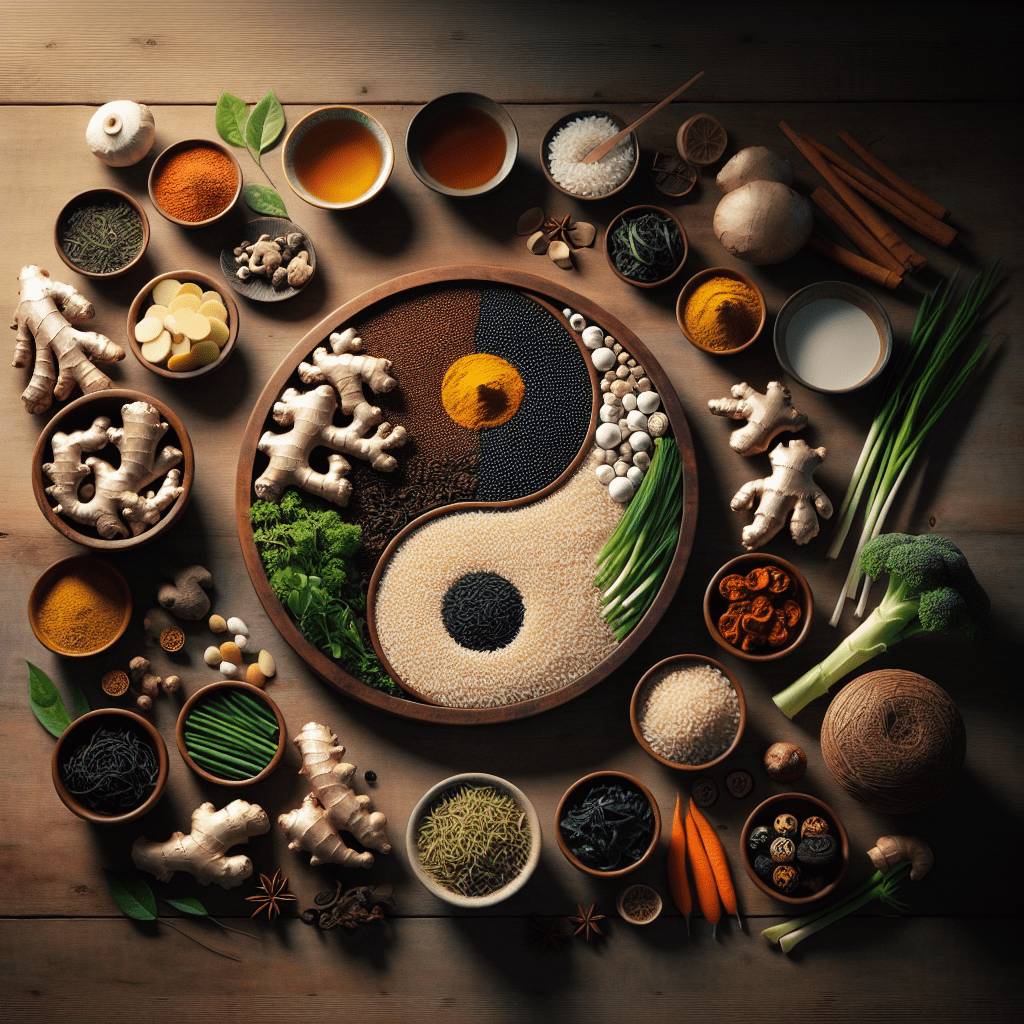Have you ever noticed how certain foods make you feel energized and balanced, while others leave you feeling sluggish or uncomfortable? This isn’t just about calories or nutrition labels – it might be about how well those foods align with your unique body type and constitution. That’s where holistic diets come in, offering a path to wellness that goes far beyond the standard Western approach to eating.
Holistic diets aren’t just meal plans – they’re comprehensive systems that nurture your physical, emotional, and spiritual well-being simultaneously. Unlike restrictive diets that focus solely on weight loss or specific health markers, holistic approaches consider the whole person and their unique needs. Recently, there’s been a surge of interest in Eastern medicine food philosophies among health-conscious individuals seeking deeper connections between their diet and overall wellness.
As someone who’s always looking for natural approaches to health, I’ve found that Eastern medicine offers fascinating perspectives on how food can be our most powerful medicine. These ancient systems didn’t just focus on what to eat – they developed intricate frameworks for understanding how different foods affect different people based on their unique constitutions.
The Wisdom of Traditional Chinese Medicine
Traditional Chinese Medicine views food as medicine, offering personalized dietary recommendations based on your unique constitution.
Traditional Chinese Medicine (TCM) stands out as one of the most comprehensive holistic diet approaches with over 2,000 years of wisdom behind it. At its core, TCM views food not just as fuel but as medicine that can either heal or harm depending on how it interacts with your unique body type.
The concept of Qi (pronounced “chee”) is central to understanding TCM’s approach to diet. Qi is the vital life force that flows through your body, and according to TCM, everything you eat either supports or disrupts this energy. Foods are classified according to their energetic properties rather than just their nutritional content.
“In TCM, we don’t just ask what vitamins are in a food – we ask how that food makes you feel, how it affects your energy, and whether it brings your body into greater harmony,” explains Dr. Lin Chen, a TCM practitioner I recently spoke with.
TCM categorizes foods according to several key qualities:
- Temperature: Foods are considered warming (like ginger or lamb), cooling (like watermelon or cucumber), neutral, or hot/cold
- Flavor: Sweet, sour, bitter, pungent, and salty – each flavor corresponds to specific organs and body systems
- Direction of energy: Some foods have rising energy (like ginger), while others have descending energy (like salt)
Constitutional Eating is perhaps the most personalized aspect of TCM dietary theory. Unlike one-size-fits-all diet plans, Constitutional Eating recognizes that each person has a unique body type or constitution that responds differently to various foods.
There are several main constitutional types in TCM, including:
- Yang Deficiency: People who feel cold easily and have slow metabolism
- Yin Deficiency: Those who run hot, may experience night sweats or insomnia
- Qi Deficiency: People who tire easily and may have weak digestion
- Blood Deficiency: Those with pale complexion and possible dizziness
- Damp Constitution: People who retain water easily and may feel heavy
Each constitution has specific dietary recommendations. For instance, someone with a Yang Deficiency would benefit from warming foods like ginger, lamb, and cinnamon, while avoiding too many cooling foods like raw vegetables or iced drinks. Meanwhile, someone with a Yin Deficiency might need more cooling foods like cucumber, watermelon, and leafy greens to balance their tendency toward heat.
The beauty of this approach is its personalization – what’s healing for one person might be imbalancing for another. This is why holistic diets based on Eastern medicine can feel so transformative compared to standardized approaches.
Eastern vs. Western Dietary Perspectives
Eastern and Western dietary philosophies differ fundamentally in how they approach nutrition, wellness, and the relationship between food and health.
When we compare Eastern and Western approaches to diet, we find fundamental philosophical differences that affect how we think about food and health.
Western dietary approaches typically focus on:
- Specific nutrients and their quantities
- Calories and macronutrient ratios
- Standardized dietary guidelines for entire populations
- Treating specific conditions with specific dietary interventions
- Scientific research focused on isolated components of foods
Eastern holistic diets, by contrast, emphasize:
- Energy and balance within the body
- Seasonal eating that aligns with natural cycles
- Personalized nutrition based on individual constitution
- Preventative approaches that maintain harmony
- Foods as part of an integrated healing system
Research increasingly supports the benefits of Eastern dietary patterns. A study published in the Journal of the American College of Nutrition found that Eastern dietary patterns were associated with lower risks of obesity and metabolic disorders compared to Western dietary patterns high in processed foods and refined carbohydrates.
Seasonal eating is another hallmark of holistic diets from Eastern traditions. TCM advises adjusting your diet according to the seasons to stay in harmony with nature’s cycles. For example, spring corresponds to the Wood element and calls for fresh, green, and slightly sour foods that support liver function and new growth. Summer, associated with Fire, benefits from cooling foods that prevent overheating.
“When we eat with the seasons, we’re supporting our body’s natural rhythms and helping it adapt to the changing environment,” says nutritionist Maya Wong. “This is something modern nutrition is only beginning to understand, but Eastern medicine has emphasized for thousands of years.”
The integration of food with other healing practices is another distinctive feature of holistic diets. In Eastern traditions, diet is never viewed in isolation but as one aspect of a comprehensive approach to wellness that might include herbs, acupuncture, meditation, and movement practices. This holistic perspective recognizes that digestive health is connected to emotional well-being, sleep quality, and overall vitality.
Practical Benefits of Adopting Holistic Diets
Holistic diets can improve digestion, energy, emotional balance, mental clarity, and natural weight management.
The benefits of embracing a holistic diet extend far beyond simple nutrition. When you eat according to Eastern medicine principles that match your constitution, you may experience improvements in:
Digestion: Many people report reduced bloating, regular elimination, and fewer digestive discomforts when eating foods that match their constitutional type. This makes sense when you consider that TCM has always emphasized the importance of digestive “fire” or energy.
Energy levels: Instead of the energy crashes common with modern diets high in refined carbohydrates, holistic diets aim to provide steady, sustained energy through balanced meals and properly prepared foods.
Emotional balance: Eastern medicine recognizes strong connections between certain foods and emotional states. For example, excessive sweet flavors might temporarily boost mood but later contribute to anxiety or overthinking.
Mental clarity: Many followers of holistic diets report improved focus and clearer thinking, which aligns with Eastern medicine’s understanding that proper nutrition supports brain function.
Natural weight management: Rather than focusing on calorie restriction, holistic diets promote eating in harmony with your body type, which often naturally leads to a healthy weight without deprivation.
Mindful eating practices are central to Eastern holistic diets. By paying attention to how foods make you feel, eating slowly, and expressing gratitude for your food, you develop a healthier relationship with eating itself.
“When I started paying attention to how different foods affected my energy and mood based on my TCM constitution, it was like discovering a personalized instruction manual for my body,” shares Sam, who adopted a TCM-based diet after years of digestive struggles. “I finally understood why certain ‘healthy’ foods everyone recommended actually made me feel worse, while others that were supposedly less nutritious made me feel great.”
Disease prevention is another compelling reason to explore holistic diets. By emphasizing balance and personalization, these approaches may help prevent chronic conditions before they develop. Research shows that traditional Eastern dietary patterns are associated with lower rates of heart disease, diabetes, and certain cancers compared to standard Western diets.
Finding Your Perfect Holistic Diet Path
Discovering your ideal holistic diet is a personal journey that blends ancient wisdom with modern knowledge to honor your unique body.
The journey to discovering your ideal holistic diet doesn’t have to mean completely abandoning familiar foods or modern nutrition science. Instead, it’s about blending ancient wisdom with contemporary knowledge to create an approach that honors your unique body.
Start by observing how different foods affect your energy, mood, digestion, and overall wellbeing. Do you feel energized after certain meals but sluggish after others? Do you tend to run hot or cold? Do you digest some foods easily while struggling with others? These observations can provide clues about your constitutional type.
Consider consulting with a practitioner trained in Eastern medicine who can help identify your constitution and provide specific dietary recommendations. Many integrate modern nutritional understanding with traditional wisdom for a truly comprehensive approach.
Remember that holistic diets emphasize balance rather than perfection. They acknowledge that needs change with seasons, age, activity levels, and health status. This flexibility makes them sustainable long-term compared to rigid dietary regimens.
The beauty of Eastern medicine food paths lies in their recognition that you are unique. What works perfectly for someone else might not be ideal for you – and that’s not a failure but simply a reflection of your individual nature.
As we blend ancient wisdom with modern understanding, we’re discovering that personalized nutrition based on constitutional types isn’t just traditional wisdom – it’s the future of nutrition. The growing field of nutrigenomics is confirming what Eastern medicine has taught for millennia: that genetic differences influence how we respond to various foods.
The holistic diets of Eastern traditions invite us to see food as more than fuel – as medicine, connection, and a path to balance. By discovering which approach aligns with your unique constitution, you unlock a personalized path to wellness that honors your individuality while connecting you to ancient wisdom.
Whether you explore Traditional Chinese Medicine’s constitutional eating, Ayurveda’s doshas, or another Eastern approach, the journey toward a more personalized and balanced relationship with food can transform not just your diet, but your entire experience of health and wellbeing. The perfect holistic diet for your body type isn’t a secret after all – it’s waiting to be discovered through mindful observation, traditional wisdom, and the courage to listen to your own body’s unique needs.



